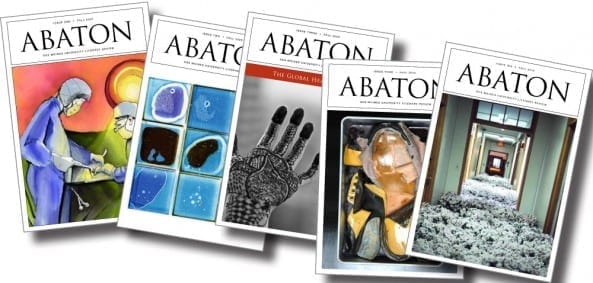With the publication of DMU’s first edition of its literary and arts review in fall 2007, “the dreams of a number of students, faculty and administrators of the College of Osteopathic Medicine and the University have come to fruition,” wrote Gary Hoff, D.O., associate professor of behavioral medicine, in his introduction in Abaton that year.
The DMU student-produced journal, which will appear in its seventh edition this year, was designed to counter the characterization of medicine as corporate and lacking the human touch, Hoff noted. With its creative works, it “provides strong, incontrovertible evidence that humanism in medicine has not disappeared,” he stated in his introduction that year. “Medicine, in the broadest sense, is indeed an art. And humanity is its foundation.”
Abaton is named after the ancient stone structure in Epidavros, Greece, where the wounded and sick rested after seeking help from Asclepius, the Greek god of medicine. Mark Stephany, D.O.’09, editor of the first edition of the journal, traveled there as an undergraduate. He left at the structure a page from a book by Richard Selzer, M.D., a surgeon and writer whose works inspired Stephany’s pursuit of medicine.
“I wrote to Dr. Richard Selzer explaining that this was the least I could do to show him how much his books have meant to me,” Stephany wrote in his editor’s note in the 2007 Abaton. “His reply urged me to follow his path in both literature and medicine.”
In 2010, Abaton began awarding the annual $1,000 Selzer Prize for short fiction or essay by a current medical student. “Richard Selzer is the paradigm of the physician-turned-writer,” Hoff wrote in the 2012 Abaton. “His example has inspired many of his readers – many of them physicians – to write down their own stories and ideas.”
Kelly Bowen, D.O.’14, co-editor of the 2013 Abaton, says the journal is “an outlet for students, alumni and guest publishers to speak about the sorts of hardships, joys and conflicting emotions unique to those in the medical field.”
She and her fellow co-editor, Brittni McLam, D.O.’15, encourage individuals, especially DMU students and alumni, to submit works for this year’s Abaton. “It’s a reflection of the DMU community, an expression of the experiences we’re involved with every day in a way that makes us think,” McLam says.
Abaton also can make DMU community members proud. John De Mott, D.O.’13, editor of last year’s edition, says, “It lends depth and richness to our understanding of the medical humanities to hear from patients, practitioners and students.”
Editors of the 2013 Abaton encourage submissions from all individuals of poetry, short stories, essays, photography and digitized images of sculpture, paintings and other forms of visual art. Submissions are selected by an editorial board consisting solely of DMU students.?For more details about Abaton and information on how to submit works, visit www.dmu.edu/abaton/submissions/.


